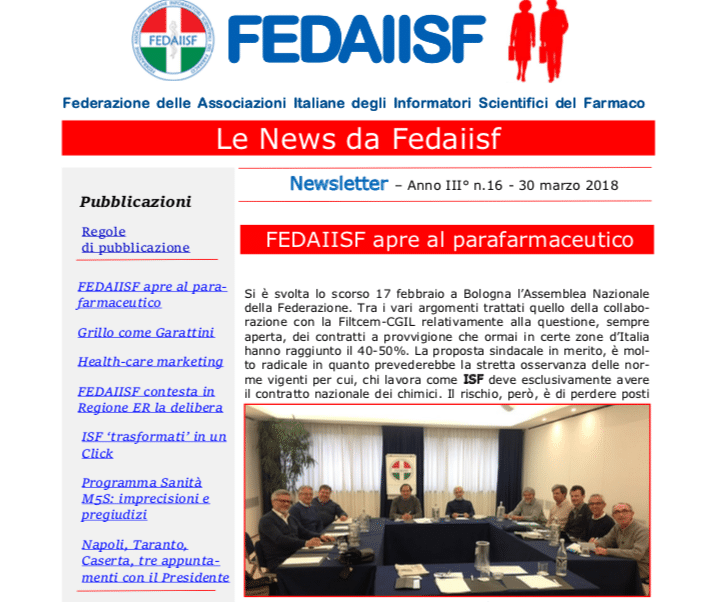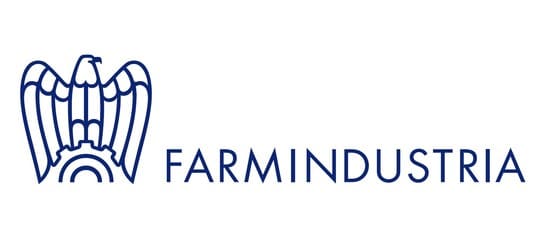
In the FEDAIISF newsletter n. 16 of 30 March, published on the Fedaiisf website, I accept with hope and enthusiasm the initiative of Filctem-CGIL for now the only acronym, of the three most representative, to undertake a commitment to return to the legality of the role which wrongly, in the last contractual renewals , was sewn on the ISF.
 Neglecting the enthusiasm that is an emotion and as such unmanageable, the hope is that the remaining acronyms will follow the example motivated by the ancient sensitivity of the union towards respect for the rules, taking into consideration the social role and legal responsibility of the ISF, not chosen but imposed, from which he will not be able to escape even if he wanted to justify his conduct by trying to assign the responsibility to the commercial will of his hierarchy endorsed, moreover, by a contractual agreement.
Neglecting the enthusiasm that is an emotion and as such unmanageable, the hope is that the remaining acronyms will follow the example motivated by the ancient sensitivity of the union towards respect for the rules, taking into consideration the social role and legal responsibility of the ISF, not chosen but imposed, from which he will not be able to escape even if he wanted to justify his conduct by trying to assign the responsibility to the commercial will of his hierarchy endorsed, moreover, by a contractual agreement.
Responsibility for conduct that does not comply with the Law rests exclusively with the Informant as he cannot adduce justifications of mere conduct in compliance with hierarchically superior provisions or deriving from ambiguous clauses of the CCNL.
The CCNL Chemicals is an excellent contract thanks to the skills and tenacity of our union delegates, however there is a stain that needs to be washed.
With the contractual renewals that have taken place since 2006 onwards, the Union has given the impression of considering us as a bargaining chip, as if it had forgotten that through the CCNL it is possible to set firm points to protect collective health while preserving, as established by law , the role of the ISF. Unfortunately he was deaf to the law, stunned by the sirens of commerce and by the ingenuity and good will to preserve jobs (in any case lost and if relocated, dispersed in a myriad of contracts that prevent concrete unionization) now is the time to demonstrate to the Workers that a legislative decree will also be worth something by not allowing, through agreements that try to straddle the Law, circumventions that allow the ISF to be treated as a commercial tool that can be maneuvered by marketing and sales management.
The initiative of the filctem and also of the Fedaiisf must be fully supported by everyone and with all the strength that one is able to express, even with membership (I am a member of the Union and the Association).
Therefore I launch a cry of alert so that our Delegates pay more attention to the possible "poisoned apples" that Farmindustria could offer them, before the contractual renewal process that began close to the previous renewal is brought to a conclusion next autumn.
 The alert is based on the memory of how the various renewals have taken place and how Farmindustria has obtained an ever greater commercial definition of the role of the ISF with each renewal and from the reading of a document drawn up by Farmindustria, the LiGF (Farmindustria Guidelines) which clearly highlights the definitive step, elaborated by the lawyers accustomed to insinuating themselves between the folds of the Law, which will sanction, if endorsed by a contractual renewal in this sense, the commercial role of the ISF and its dependence on (never clearly mentioned in the document but opportunistically generically defined Structure) Sales Management and offers the definitive interpretation of the contract that will have to be applied to the ISF. Companies that will be able to, will choose the contract that will allow for the least possible unionization of the Workers (make an effort to remember the bitter fate of the Rottapharm colleagues who "pushly" chose the transition from the Chemicals contract to the one with a VAT number before the acquisition by Meda).
The alert is based on the memory of how the various renewals have taken place and how Farmindustria has obtained an ever greater commercial definition of the role of the ISF with each renewal and from the reading of a document drawn up by Farmindustria, the LiGF (Farmindustria Guidelines) which clearly highlights the definitive step, elaborated by the lawyers accustomed to insinuating themselves between the folds of the Law, which will sanction, if endorsed by a contractual renewal in this sense, the commercial role of the ISF and its dependence on (never clearly mentioned in the document but opportunistically generically defined Structure) Sales Management and offers the definitive interpretation of the contract that will have to be applied to the ISF. Companies that will be able to, will choose the contract that will allow for the least possible unionization of the Workers (make an effort to remember the bitter fate of the Rottapharm colleagues who "pushly" chose the transition from the Chemicals contract to the one with a VAT number before the acquisition by Meda).
Below are some excerpts from the LiGF, I omit to comment on them due to the banality of the objections that could be raised against them
quibble, their meaning is clear to all those who do not want to be fooled by the sirens of commerce.
In this context there are no shades of gray and the Syndicate can resolve the doubt only by deciding where to take sides:
on the side of the Law that defines the role of the ISF in a very rigid way or to take the side of the Master who tries to bend the Law to his interests, persevering in leaving the ISF alone in the battle for legality that we fight every day in Agency.
Italy has always been a broken country, to find examples of governments that are not entirely lazzaroni but nonetheless with a clever percentage of populism we have to go back (I regret to say it) to the 60s, we the people are not free from faults but we prefer not to see them , let's work so that the country doesn't break down even more, let's reverse a trend by not allowing the second hypothesis to prevail.
NB: I find myself intolerant but I cannot fail to define Farmindustria's behavior as interested in its vegetable garden because these LiGFs are not dictated by the desire to respect Legislative Decree 219/06 but solely from the need to escape the rigors of Legislative Decree 231/01. If you carefully read the remaining part of the LiGF (which can be found on their website), you will notice the intention to circumvent the ban on supporting the ISF imposed by the Guidelines of the Regional Regulations.
The alert is aimed above all at the Union which has the burdensome delegation, hopefully not disappointing with respect to the Law, to negotiate for us.
If the ISF will remain in the commercial area, this renewal will definitively establish its role and task, but we will continue to fight
strong in the law:
the Syndicate will have to decide, aware of taking on a serious responsibility if it will deliver the fate of the ISF definitively into the hands of Commerce.
Antonio Giammei Delegate UILTEC RSU ACRAF
EXCERPT OF THE LiGF
PREMISE
 This document deals only with the peculiarities of the pharmaceutical sector, while for the general part, please refer to the document
This document deals only with the peculiarities of the pharmaceutical sector, while for the general part, please refer to the document
Confindustria "guidelines for the construction of models of organization, management and control pursuant to Legislative Decree 231/2001".
Furthermore, this document presupposes and adopts the "reference document for the certification of the procedures relating to the activities
of scientific information" issued by Farmindustria, to which it therefore refers in full for the purpose of a future final drafting of the guidelines in the pharmaceutical sector.
The document also does not interfere with the organizational autonomy of individual companies which remains preserved.
The document is divided into three chapters: the first concerns relations with typical subjects in the pharmaceutical sector; the second chapter deals with relations with the Public Administration; the third chapter deals with the risks of crime in relations with private subjects, also in consideration of the entry into force of Law 6 November 2012, n. 190 (so-called "anti-corruption law").
The guidelines refer to:
Legislative decree 24 April 2006 number 219
Decree of the Ministry of Health of 14 April 2008
Reference document for the certification of procedures relating to scientific information activity
CHAPTER ONE: RELATIONS WITH TYPICAL PARTIES IN THE PHARMACEUTICAL SECTOR
TO) SCIENTIFIC INFORMATION ACTIVITY
Risk area
With reference to the activities carried out by the ISFs, the area of risk lies in their contacts with health professionals. Such activities,
if not suitably governed from an organizational-procedural point of view, they can constitute an occasion for attempts to
determine the prescriptions even by illicit means, to the detriment of carrying out the scientific information activity.
Therefore it is necessary to properly manage the organization of the
sales representatives, the definition of variable remuneration and the
expense report management and control system.
A.1 ORGANIZATION OF SCIENTIFIC REPRESENTATIVES
General consideration
The employment relationship between the pharmaceutical company and the scientific representatives (hereinafter referred to as ISFs) who carry out the scientific information activity of their products, as well as the hierarchical/functional relationship between the ISFs and the corporate functions constitute
important aspects in the context of an organizational model pursuant to Legislative Decree 231/2001.
The art. 122, paragraph 3 of Legislative Decree 219/2006 "Implementation of directive 2001/83/EC (and subsequent amending directives) relating to a Community code concerning medicinal products for human use, as well as of directive 2003/94/EC" ( hereinafter "Drug Code") provides that the activity of the ISF must be carried out "on the basis of an employment relationship established with a single pharmaceutical company", except for exceptions which may be provided for by decree of the Minister of Health, upon proposal of AIFA, due to the size and characteristics of the companies.
The Medicines Code therefore limits itself to imposing the uniqueness of the employment relationship between the ISF and the pharmaceutical company - thus prohibiting, save for specific exceptions, that the ISF can maintain employment relationships with several pharmaceutical companies - without, however, regulating the type of employment relationship work (as is indirectly confirmed by paragraph 1 of art. 122, which, providing for the obligation to communicate to AIFA the type of employment contract of the ISF, admits the possible variety).
The art. 122, paragraph 6 of the Pharmaceutical Code provides that the ISF "must report to the Scientific Service referred to in article 126, from which
they depend, and to the head of the pharmacovigilance service (..) all the information on the undesirable effects of medicines (..)". In turn, the art. 126 of the Medicines Code states that the Scientific Service - which is "in charge of information on medicines" that the company places on the market - "must be independent from the marketing Service of the pharmaceutical company" and is required, among other things , to verify that the ISF are in possession of adequate training and comply with the obligations imposed by the Medicines Code.
The Drug Code therefore provides for the functional dependence of the ISFs on the Scientific Service, which has the task of overseeing their formation and guaranteeing the scientific correctness of the message.
Organizational-procedural profile
Type of employment relationship between the ISF and the pharmaceutical company
The subordinate employment relationship, which is the most frequently used in practice, appears to be the abstractly most effective from the point of view of the ability to prevent possible criminal activities of the ISFs, in view of Legislative Decree 231/2001. In fact, the subordinate employment relationship allows the employer - in this case, the pharmaceutical company - to exercise, through suitable directives, a penetrating control over the work of the FSIs, as regards both the working activity in the strict sense and, above all, to the activity of professional and scientific training.
If types of employment relationships other than that of the subordinate relationship are adopted, or para-subordination relationships (such as those of project work and work administration or staff leasing) or self-employment relationships, it will be necessary, without prejudice to the purely labor law requirement of maintaining the characteristics of self-employment or para-employee work for these relationships, reconciling the greater operational and decision-making autonomy of the FSIs with appropriate contractual remedies (in terms of training and verification), such as to ensure punctual compliance by the FFIs with the company code of conduct, and which may lead to the application of penalties (similar in content to the disciplinary measures applicable to employees), up to the termination of the employment relationship, in the event of serious non-compliance by the ISF.
The activity of the ISFs generally takes place under the hierarchical dependencies of the Structures responsible for the operational management of the ISFs, and therefore subject to the directives of the various Area Managers who operate in said Structures, who in turn answer to the Managers of the Structures themselves.
From this point of view, it is up to the aforementioned Structures to regulate the activity of the ISFs through the elaboration of the so-called "operating activity cycles", in
which the scientific information strategy is precisely described (with reference, for example, to the general practitioners and specialists to contact, the number of visits to be made, the products to be presented and promoted, the assignment of promotional material, free samples , etc.) to be implemented in the respective period for the various therapeutic areas.
In this regard, the operating cycles must be structured in such a way as to respond not only to legitimate commercial needs but also - and above all - to needs aimed at guaranteeing scientific content and appropriate and correct operational and relational methods, such as to prevent the risk of any crimes.
Therefore, this - unavoidable - management activity carried out by the aforementioned Structures, must be subjected to the supervision and control of the Scientific Service, on which the ISF functionally depend. It is therefore necessary that the Scientific Service, in a position of autonomy and independence from the Structure, through its manager, reviews and approves the promotional information material used by the ISFs, the operating cycle, the relative instructions provided to the ISFs, guaranteeing their correctness under the scientific and ethical profile.
Education and Training
The intervention of the Scientific Service also appears necessary in terms of training activities. From this point of view, the education and training activities of the ISFs are of particular importance and must consequently be subject to adequate planning, if only because the ISFs relate to the Public Administration [PA] (doctors, pharmacists, health professionals) directly and almost daily, conveying information content on products/therapeutic areas managed by the pharmaceutical company.
In this context, the training activity can be carried out through, for example:
• participation in external seminars and courses aimed at gaining knowledge of technologies,
aspects and methodologies of a general or specific nature;
• holding internal meetings, possibly also with the support of external consultants to facilitate understanding of specific topics;
• dissemination of publications, information and technical documents;
• participation in internal and/or external specialist courses;
• coaching by more expert personnel for a given
period of time;
• e-learning (distance training).
It is necessary that the training intervention on the ISF privileges not only the scientific information properly so called on the specific "product portfolio", but also didactic courses concerning, for example, the following topics:
Legislative Decree 219/2006 and related legislation;
Farmindustria Code of Conduct;
Legislative Decree 231/2001;
Reference document for Farmindustria certification of procedures relating to scientific information activities;
Organisation, management and control model pursuant to Legislative Decree 231/01, internal regulations and procedures;
Company Code of Ethics;
Safety regulations;
Regional regulations on scientific information;
Chemical-pharmaceutical CCNL.
Consistent with this aim, the training plan for the ISFs is carried out on the initiative of the Scientific Service in coordination with the Structure in charge of the Operational Management of the ISFs.
The Scientific Service must also intervene not only directly in the training phase itself, but also after it, or rather on the control of the training provided to the ISFs. The monitoring of the effectiveness of the training interventions can be carried out, for example, through interviews and learning verification tests following the individual thematic areas, with variable barriers of correct answers to access the next area (distance training - so-called system of the "self-assessment").
On the basis of these evaluation tools, the Scientific Service must be able to:
a) evaluate the skills possessed/demonstrated by the FSI with reference to the skills and knowledge required;
b) identify areas for improvement;
c) draw up a structured plan of training activities and development actions aimed at supporting any skill gaps identified.
To this end, the agendas of the training meetings and the learning assessment reports relating to the ISF must be filed in such a way as to allow for control by the Scientific Service.





